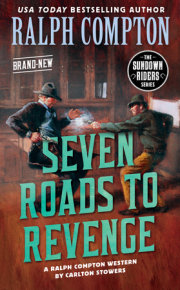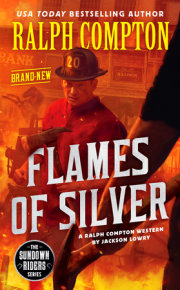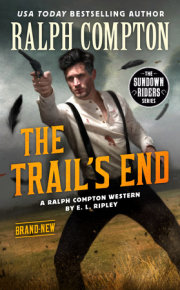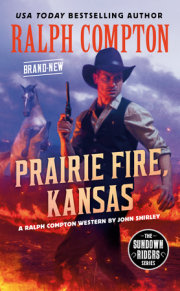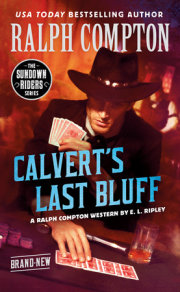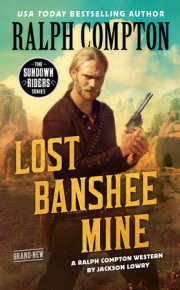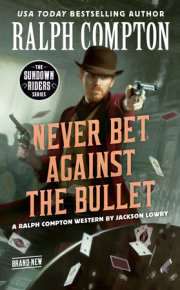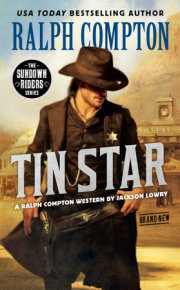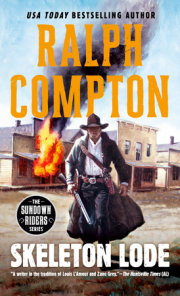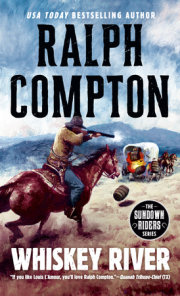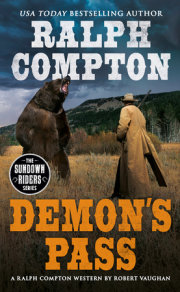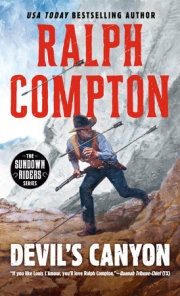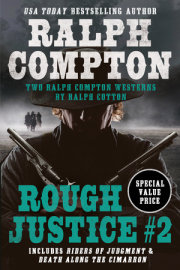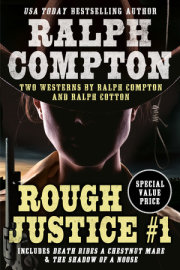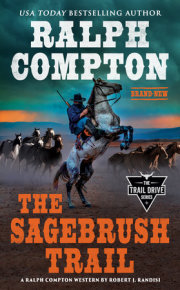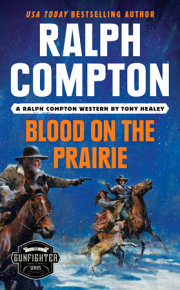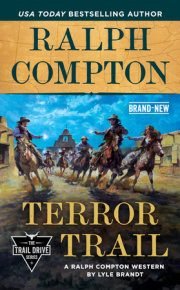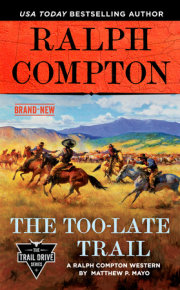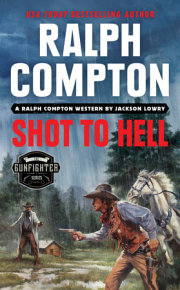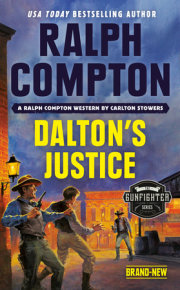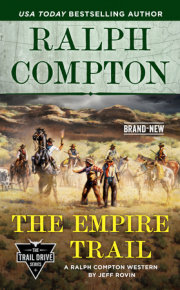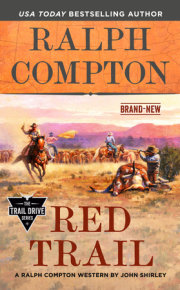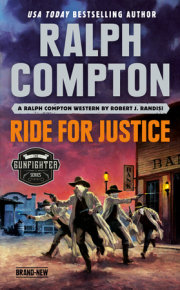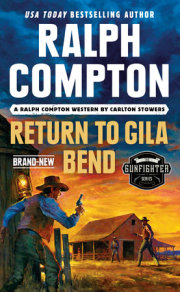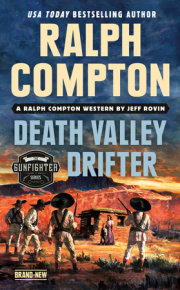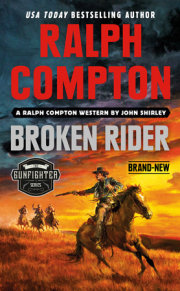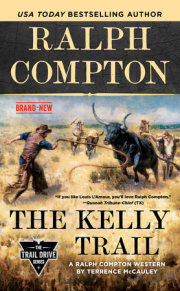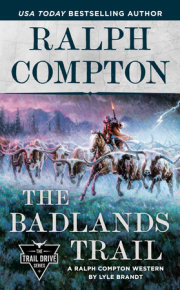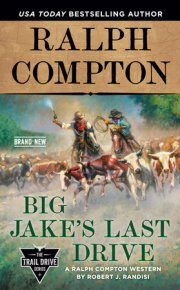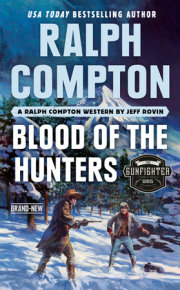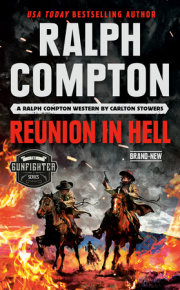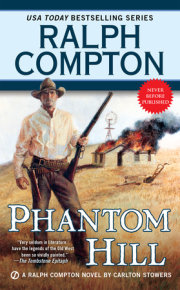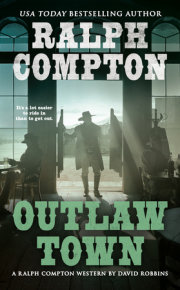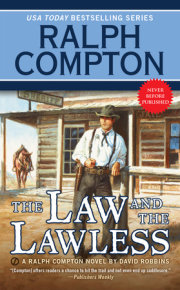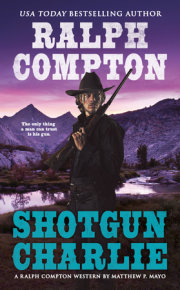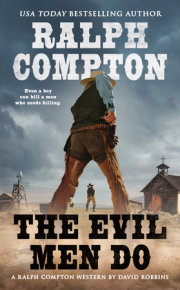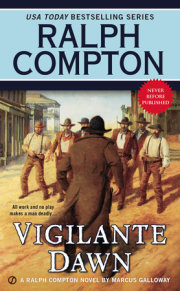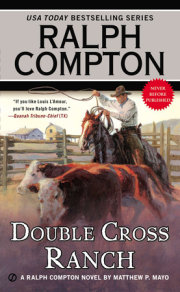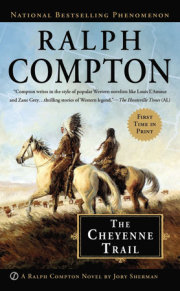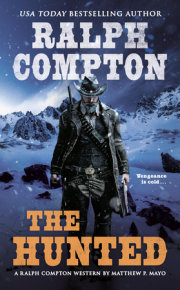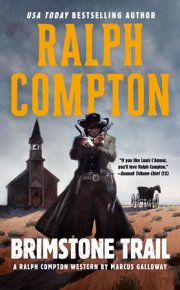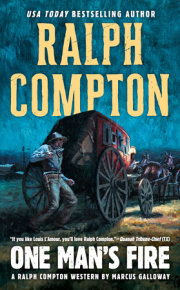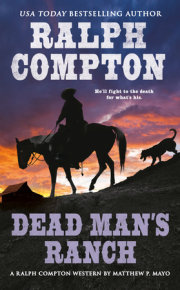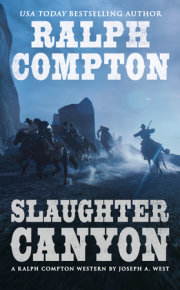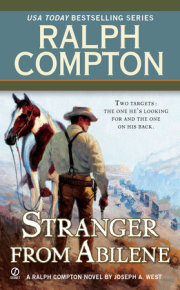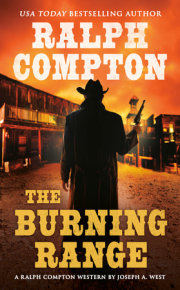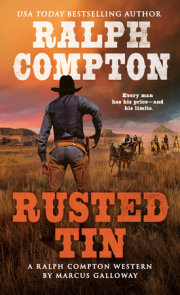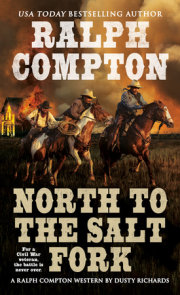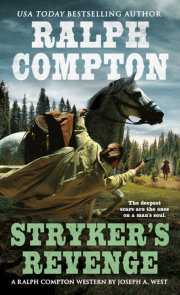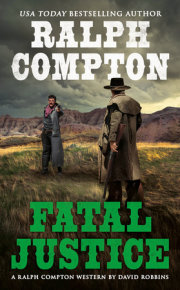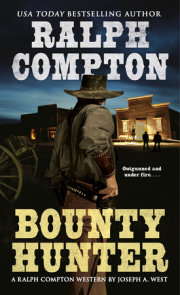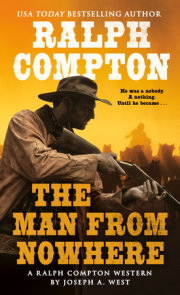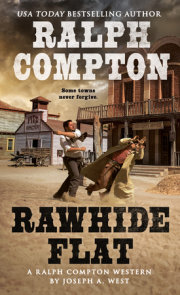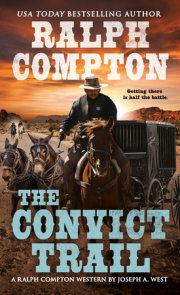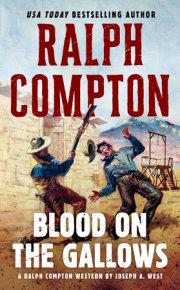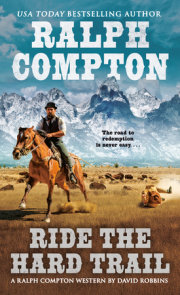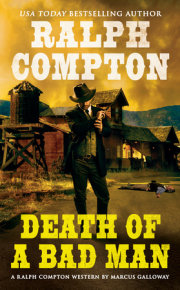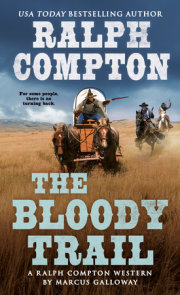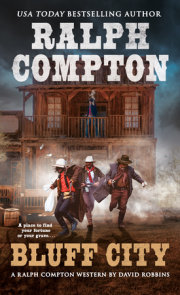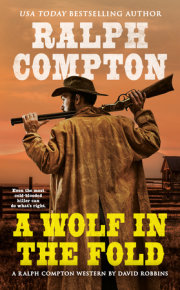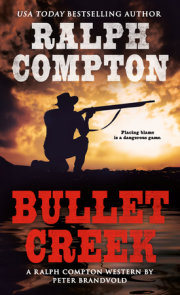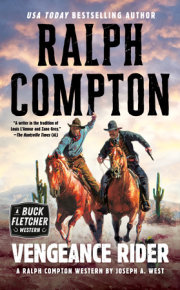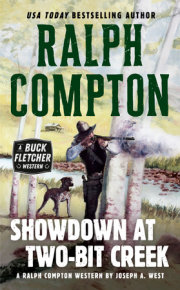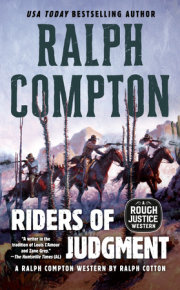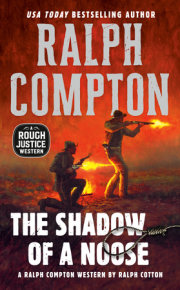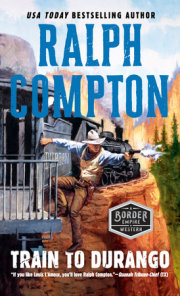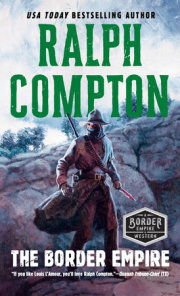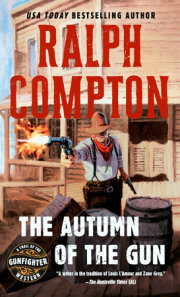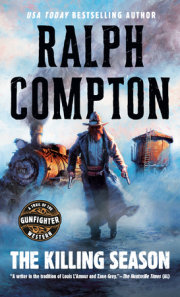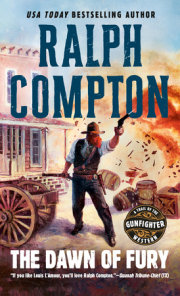His wife is gone to tuberculosis, his reputation was lost in the war, most of his life has already passed by, and now even his horse has been taken by colic. All Carpenter has left are the men from his Army company. During the journey to California to reunite with them, he strikes up a friendship with Rafael Silva, an educated man making for the same town to start up a rifle factory.
When they arrive, Carpenter's former brothers-in-arms actually try to run Silva out of town, despite the much needed factory. There's trouble afoot, and Carpenter has to choose between his new friend and the ones who stood with him through the war. His old comrades just aren't who they used to be but, then, neither is he.
Chapter One
It wasn't quite twenty years ago that someone had stolen Carpenter's saddle in broad daylight on a crowded street in Charlotte. That was only a memory. It had been nearly that many years since the war-so the war should've just been a memory too, but it was never that simple.
Lumps of hard resin marred the varnish, and the edges of the chessboard had all the signs of a dull saw and a shaky hand. The kindest word for this work was shoddy, and the piece was altogether out of place in an otherwise respectable lodge. The very chair Carpenter sat in was a work of art, some of the finest wickerwork he'd ever seen, and there were carvings on the hearth that wouldn't have been out of place in a church. The chessboard, though-it was a disaster.
Well, even bad work was good for something: you could always learn from it.
"Do you play?"
Carpenter looked up, setting his thoughts aside and finding his voice, which took a moment.
"Your pardon?" he said.
This man had already been here when Carpenter had walked up earlier in the day, gingerly leading Oceana by the reins. He'd been out on the porch in his shirtsleeves with his legs crossed and a book in his hand, but he hadn't been reading it.
He was well dressed in gray, and the cloth had a nice tartan pattern, but Carpenter couldn't tell the difference between a suit from overseas and one that was just meant to look that way. In any case, the fellow held a respectful distance, and that thick bear rug must've muffled his footsteps as he approached. Not that footsteps would've made any difference; Carpenter's senses weren't what they'd been, but they weren't gone entirely. He'd just been trying so hard to let his mind go anywhere but here, and for a moment, he'd succeeded.
The man indicated the board with his eyes, and Carpenter looked at the knight in his hand.
"Not well," he replied, putting it back. "Just admiring the craftsmanship."
"And how is it?"
It took an effort, but Carpenter found something like a smile. "It's got the right number of squares."
The man let out a little snort of laughter, but it wasn't much. A blind man would've been able to tell this fellow wasn't having much of a day himself.
"These, though," Carpenter added after a moment, shaking a finger at the pieces. "Someone worked hard on them." They'd all been whittled by hand. Not well, but they were all recognizable. The artisan had even taken the time to paint the eyes of all the knights red.
"It's a better job than I could do," remarked the man in gray.
"I'm the same." Carpenter leaned back in his armchair. "No talent for detail."
"Could I interest you in a game?"
Nothing could have interested him less, but playing couldn't be worse than just sitting there alone.
"Why not?" Carpenter gestured at the other chair.
The other man nodded politely and seated himself, adjusting the chain of his pocket watch and the gun at his hip, which was about the most foolish thing Carpenter had ever seen. It was polished so brightly that it would blind anyone in the sun, with enough inlaid gold and engravings for a dozen picture frames. He hoped he was imagining that sheen in the grips, and that they were just ivory and not real mother-of-pearl. There was more gaudiness in that gun than in entire shops of jewelry in Richmond.
But Richmond was a long way away. This was California.
Carpenter halfheartedly shoved a pawn forward two spaces. The man in gray moved one as well. Seven moves went by without a single word spoken, and that was merciful. He'd been afraid this man had been lonely, the type who needed to talk to pass the time. Maybe he wasn't as bad as his gun and his exaggerated grooming made him look. Who was he trying to impress here anyway?
There were only four other guests at the lodge: two businessmen traveling together, their driver, and a younger fellow dressed like a cowhand, who kept to himself.
And the dog, of course. It was a good-sized staghound curled up on the rug by the window, where the sun was warmest. Not a woman in sight, but this chess player wanted to be as pretty as he'd be going to a dance.
A brand-new wagon waited outside, and an older stagecoach. The stagecoach belonged to those two others, so this fellow was the one with the wagon. He didn't just look educated; he sounded like it too, something in the way he made sure to say each piece of each word just the right way.
Carpenter moved his rook. He didn't care if the stranger had been educated in a school or in a barrel; it was none of his business. He was just glad to have something to do, though he wouldn't admit it.
The other fellow turned toward the dog, who had lifted her head to look at the door, which opened.
It was Dr. Ambrose, still a bit stooped, still fidgeting with his left hand. He didn't say anything; he just caught Carpenter's eye.
"Excuse me," Carpenter told the man in gray, who nodded.
Maybe it didn't look good to walk away from a game of chess that he was losing to a man at least twenty years his junior, but that didn't matter. It was warm and sunny outside, but cold in his belly as he trailed the doctor onto the porch, down the stairs, past the towering pines, and over to the stable. He'd left his hat in the lodge, and he squinted at the sun, which got lower every minute. He knew what that felt like.
Any other afternoon, the doctor's bright red nose and unruly mustache might've made him difficult to take seriously. As it was, Carpenter couldn't have smiled even if he had tripped and fallen headfirst into a gold mine.
They stopped outside the doors, but well within the smell of the stable.
Ambrose wasn't about to tell him anything he didn't already know, or hadn't seen in his eyes, but the doctor went on and opened his mouth anyway.
"It's like you thought," he said, looking Carpenter in the eye. "The colic. Bad."
Inside, out of the sun, Oceana lay on her side, flank rising and falling with all the power of a dying sparrow. Strange noises came from her nostrils, and her eyes were shut. Her legs trembled.
Carpenter stared down at her, and Ambrose stood at his side for a minute or two.
"I seen that bird gun in your things," the doctor said hesitantly. "Would you like a rifle, Mr. Carpenter?"
It was the last thing he wanted, but he nodded anyway. The doctor went to his own horse, and Carpenter stood there. Just the standing was difficult enough; doing anything more seemed unreasonable. His breaths were as deep and slow as hers were shallow and fast, but they were just as desperate.
Something cool touched his hand, and he took the rifle from the doctor without even looking at him.
Quietly, Ambrose led the other horses out into the sunlight. It was best if they weren't startled by what was coming. Carpenter wondered if it was the same for them as it was for people, if seeing one of their own die would stay with them. He hoped not; horses didn't get to drink whiskey, after all.
The hay was fresh, the feed in the bags was not, and something had died recently in this stable. The odors crowded in, and this must have been what it felt like to wear a corset on a hot day, only Carpenter didn't faint, because someone touched his arm.
It was the man in gray, and there was no longer any sunlight coming in through the crack in the barn door. Carpenter blinked and then wiped his eyes, looking around hurriedly. Oceana still lay at his feet, still breathing, though now the breaths were almost too shallow to see.
The sun was nearly down. Just like that, the time had gone. Vanished, like his saddle twenty years ago in Charlotte.
Dr. Ambrose was probably still standing out there with the other horses, waiting. Carpenter took a breath, and when he swallowed, it was like a strong man had rammed a handful of gravel down his throat.
He still had the doctor's rifle, but the man in gray put his hand out, offering to take it.
"No," Carpenter said, straightening. "No, I'll do it."
The stranger nodded, and then he took a step back and covered his ears.
Chapter Two
There wouldn't be another horse.
The couple who owned the lodge was sympathetic, but they couldn't sell their mare. It went without saying that the owners of the stage and the wagon couldn't very well part with their teams. There wasn't a horse to spare, nor was there anywhere to get one less than sixty miles away.
The last town Carpenter had passed through hadn't even had a name, much less the guarantee of a mount for sale, if he could even make it that far on foot. He didn't like to think of himself as an old man just yet, but he wasn't a young one, either, and he'd never felt it like he felt it now.
There might have been a chance of going aboard that stage, but they were headed the wrong way. Might as well go on to Antelope Valley; no sense going back. It would be a little farther, and a little harder, going uphill and all. Horse or no horse, it would be a tough trail. The difference was that with no horse, it would also be a long one.
Back in the lodge, the owner handed him a glass of something clear and strong, but Carpenter just sat in his chair. It would've been nice to just drink it, get his boots off, and let it all go until morning. Only if he was going to make it that far on foot, being sick from whiskey, or whatever this swill was, wouldn't help.
The staghound got up from her place in front of the fire and padded over, pushing her face at his thigh. Carpenter straightened and scratched the dog behind her ears, and she made agreeable chuffing noises, leaving the leg of his trousers covered in her dark hairs.
"What is that you're drinking?" the man in gray asked.
This time Carpenter didn't look up. And the other man didn't wait for an invitation; he just took his seat on the other side of the chessboard. The businessmen from Charleston were maintaining a distance that probably had nothing to do with manners. It wasn't lost on any of them that Carpenter had stood there for half an hour, frozen, before this man had entered the stable to nudge him into doing what he had to.
They all probably thought he wasn't right. That didn't particularly offend him. Dr. Ambrose had been thoughtful, or perhaps just wise, to wait him out. Or had he sent this young man in? It didn't matter.
The dog drew back, looking at Carpenter expectantly. He let out his breath and looked at the glass.
"I don't rightly know," he said at last, taking a sniff.
The man leaned forward, holding out a hand. Carpenter gave up the glass readily, and the man in gray took a brave drink. He wrinkled his nose, but stopped short of making a face.
"Interesting," he said, giving the glass back. Carpenter put it down. "No shame in taking a drink on a day like today."
"No shame in taking one any day," Carpenter replied, watching the staghound, who stared straight back at him, tongue out. He reached out and rubbed her head again.
The other man nodded, then glanced at the board. "Would you like to finish?"
"You've got me licked."
"You didn't see this?" He pointed, and Carpenter looked. There was an opening there.
"I didn't." Carpenter went ahead and knocked his king over.
"Neither did I. Can't call that a won battle, can you? One you win through sheer luck." The other man knocked his over as well. "I'm sorry about your mare."
"Thank you."
"I heard the doctor call you Carpenter. What do you do, Mr. Carpenter?"
"Besides walk?" At another time, the self-pity might not have come so easily. It wasn't just today, though. It wasn't just Oceana, and walking would be his primary occupation for the next few days.
"I've only seen you sit. My name is Rafael Silva. I know it's not a good day, Mr. Carpenter."
"It's almost over, though." He picked up the glass, held it up, and took just a sip. It was like drinking fire, but it wasn't the first time.
Silva took the glass from him and sipped as well, this time prepared for the distinctive flavor, if that was the word for it.
"I know you're stranded," he said, setting the glass down.
No sense denying it. Carpenter nodded. "Least of my troubles," he replied, gazing at the glass.
"I do have whiskey," Silva noted. He lowered his voice, glancing at the owner, who was in the kitchen. "What isn't clear to me is why he doesn't."
"I'm sure someone like me came along and drank it all."
"To be sure. Mr. Carpenter, if you're making west, you're welcome to ride with me." Silva put his hand out to his right, and the staghound automatically moved to position her head for easy scratching. "And Maria."
"I wouldn't do that to you, Mr. Silva. But thank you. You show a lot of kindness to a stranger."
He shrugged and scratched Maria fondly. The staghound flopped over, and he leaned to scratch her belly.
"It costs me nothing," he said. "Good night."
Carpenter said nothing in reply. He couldn't have, even if he'd wanted to. He watched Silva go, and there was a temptation not to move. To stay put in the armchair and let the firewater do all the work.
But he'd regret it tomorrow.
Resignedly, he dragged himself to his feet, and up the stairs, and to his room. It was hard to know exactly what the night would hold for him; the only safe bet was that he wouldn't much care for it. Getting his boots off was always a chore, but doubly so tonight. It didn't matter if it was age or self-pity that was slowing him down, because either one was sure to get worse before it got better.
A reasonable man might have expected to be visited by the memory of his faithful horse, but Carpenter had a feeling he wasn't that lucky. He settled down on his bed, a luxury not to be taken for granted with a long walk ahead of him. There had been a time when he'd felt something like fear when sleep came, but that was far behind him. The years had taken what had once been an ordeal and turned it into what could only be called business as usual.
About
His wife is gone to tuberculosis, his reputation was lost in the war, most of his life has already passed by, and now even his horse has been taken by colic. All Carpenter has left are the men from his Army company. During the journey to California to reunite with them, he strikes up a friendship with Rafael Silva, an educated man making for the same town to start up a rifle factory.
When they arrive, Carpenter's former brothers-in-arms actually try to run Silva out of town, despite the much needed factory. There's trouble afoot, and Carpenter has to choose between his new friend and the ones who stood with him through the war. His old comrades just aren't who they used to be but, then, neither is he.
Author
Excerpt
Chapter One
It wasn't quite twenty years ago that someone had stolen Carpenter's saddle in broad daylight on a crowded street in Charlotte. That was only a memory. It had been nearly that many years since the war-so the war should've just been a memory too, but it was never that simple.
Lumps of hard resin marred the varnish, and the edges of the chessboard had all the signs of a dull saw and a shaky hand. The kindest word for this work was shoddy, and the piece was altogether out of place in an otherwise respectable lodge. The very chair Carpenter sat in was a work of art, some of the finest wickerwork he'd ever seen, and there were carvings on the hearth that wouldn't have been out of place in a church. The chessboard, though-it was a disaster.
Well, even bad work was good for something: you could always learn from it.
"Do you play?"
Carpenter looked up, setting his thoughts aside and finding his voice, which took a moment.
"Your pardon?" he said.
This man had already been here when Carpenter had walked up earlier in the day, gingerly leading Oceana by the reins. He'd been out on the porch in his shirtsleeves with his legs crossed and a book in his hand, but he hadn't been reading it.
He was well dressed in gray, and the cloth had a nice tartan pattern, but Carpenter couldn't tell the difference between a suit from overseas and one that was just meant to look that way. In any case, the fellow held a respectful distance, and that thick bear rug must've muffled his footsteps as he approached. Not that footsteps would've made any difference; Carpenter's senses weren't what they'd been, but they weren't gone entirely. He'd just been trying so hard to let his mind go anywhere but here, and for a moment, he'd succeeded.
The man indicated the board with his eyes, and Carpenter looked at the knight in his hand.
"Not well," he replied, putting it back. "Just admiring the craftsmanship."
"And how is it?"
It took an effort, but Carpenter found something like a smile. "It's got the right number of squares."
The man let out a little snort of laughter, but it wasn't much. A blind man would've been able to tell this fellow wasn't having much of a day himself.
"These, though," Carpenter added after a moment, shaking a finger at the pieces. "Someone worked hard on them." They'd all been whittled by hand. Not well, but they were all recognizable. The artisan had even taken the time to paint the eyes of all the knights red.
"It's a better job than I could do," remarked the man in gray.
"I'm the same." Carpenter leaned back in his armchair. "No talent for detail."
"Could I interest you in a game?"
Nothing could have interested him less, but playing couldn't be worse than just sitting there alone.
"Why not?" Carpenter gestured at the other chair.
The other man nodded politely and seated himself, adjusting the chain of his pocket watch and the gun at his hip, which was about the most foolish thing Carpenter had ever seen. It was polished so brightly that it would blind anyone in the sun, with enough inlaid gold and engravings for a dozen picture frames. He hoped he was imagining that sheen in the grips, and that they were just ivory and not real mother-of-pearl. There was more gaudiness in that gun than in entire shops of jewelry in Richmond.
But Richmond was a long way away. This was California.
Carpenter halfheartedly shoved a pawn forward two spaces. The man in gray moved one as well. Seven moves went by without a single word spoken, and that was merciful. He'd been afraid this man had been lonely, the type who needed to talk to pass the time. Maybe he wasn't as bad as his gun and his exaggerated grooming made him look. Who was he trying to impress here anyway?
There were only four other guests at the lodge: two businessmen traveling together, their driver, and a younger fellow dressed like a cowhand, who kept to himself.
And the dog, of course. It was a good-sized staghound curled up on the rug by the window, where the sun was warmest. Not a woman in sight, but this chess player wanted to be as pretty as he'd be going to a dance.
A brand-new wagon waited outside, and an older stagecoach. The stagecoach belonged to those two others, so this fellow was the one with the wagon. He didn't just look educated; he sounded like it too, something in the way he made sure to say each piece of each word just the right way.
Carpenter moved his rook. He didn't care if the stranger had been educated in a school or in a barrel; it was none of his business. He was just glad to have something to do, though he wouldn't admit it.
The other fellow turned toward the dog, who had lifted her head to look at the door, which opened.
It was Dr. Ambrose, still a bit stooped, still fidgeting with his left hand. He didn't say anything; he just caught Carpenter's eye.
"Excuse me," Carpenter told the man in gray, who nodded.
Maybe it didn't look good to walk away from a game of chess that he was losing to a man at least twenty years his junior, but that didn't matter. It was warm and sunny outside, but cold in his belly as he trailed the doctor onto the porch, down the stairs, past the towering pines, and over to the stable. He'd left his hat in the lodge, and he squinted at the sun, which got lower every minute. He knew what that felt like.
Any other afternoon, the doctor's bright red nose and unruly mustache might've made him difficult to take seriously. As it was, Carpenter couldn't have smiled even if he had tripped and fallen headfirst into a gold mine.
They stopped outside the doors, but well within the smell of the stable.
Ambrose wasn't about to tell him anything he didn't already know, or hadn't seen in his eyes, but the doctor went on and opened his mouth anyway.
"It's like you thought," he said, looking Carpenter in the eye. "The colic. Bad."
Inside, out of the sun, Oceana lay on her side, flank rising and falling with all the power of a dying sparrow. Strange noises came from her nostrils, and her eyes were shut. Her legs trembled.
Carpenter stared down at her, and Ambrose stood at his side for a minute or two.
"I seen that bird gun in your things," the doctor said hesitantly. "Would you like a rifle, Mr. Carpenter?"
It was the last thing he wanted, but he nodded anyway. The doctor went to his own horse, and Carpenter stood there. Just the standing was difficult enough; doing anything more seemed unreasonable. His breaths were as deep and slow as hers were shallow and fast, but they were just as desperate.
Something cool touched his hand, and he took the rifle from the doctor without even looking at him.
Quietly, Ambrose led the other horses out into the sunlight. It was best if they weren't startled by what was coming. Carpenter wondered if it was the same for them as it was for people, if seeing one of their own die would stay with them. He hoped not; horses didn't get to drink whiskey, after all.
The hay was fresh, the feed in the bags was not, and something had died recently in this stable. The odors crowded in, and this must have been what it felt like to wear a corset on a hot day, only Carpenter didn't faint, because someone touched his arm.
It was the man in gray, and there was no longer any sunlight coming in through the crack in the barn door. Carpenter blinked and then wiped his eyes, looking around hurriedly. Oceana still lay at his feet, still breathing, though now the breaths were almost too shallow to see.
The sun was nearly down. Just like that, the time had gone. Vanished, like his saddle twenty years ago in Charlotte.
Dr. Ambrose was probably still standing out there with the other horses, waiting. Carpenter took a breath, and when he swallowed, it was like a strong man had rammed a handful of gravel down his throat.
He still had the doctor's rifle, but the man in gray put his hand out, offering to take it.
"No," Carpenter said, straightening. "No, I'll do it."
The stranger nodded, and then he took a step back and covered his ears.
Chapter Two
There wouldn't be another horse.
The couple who owned the lodge was sympathetic, but they couldn't sell their mare. It went without saying that the owners of the stage and the wagon couldn't very well part with their teams. There wasn't a horse to spare, nor was there anywhere to get one less than sixty miles away.
The last town Carpenter had passed through hadn't even had a name, much less the guarantee of a mount for sale, if he could even make it that far on foot. He didn't like to think of himself as an old man just yet, but he wasn't a young one, either, and he'd never felt it like he felt it now.
There might have been a chance of going aboard that stage, but they were headed the wrong way. Might as well go on to Antelope Valley; no sense going back. It would be a little farther, and a little harder, going uphill and all. Horse or no horse, it would be a tough trail. The difference was that with no horse, it would also be a long one.
Back in the lodge, the owner handed him a glass of something clear and strong, but Carpenter just sat in his chair. It would've been nice to just drink it, get his boots off, and let it all go until morning. Only if he was going to make it that far on foot, being sick from whiskey, or whatever this swill was, wouldn't help.
The staghound got up from her place in front of the fire and padded over, pushing her face at his thigh. Carpenter straightened and scratched the dog behind her ears, and she made agreeable chuffing noises, leaving the leg of his trousers covered in her dark hairs.
"What is that you're drinking?" the man in gray asked.
This time Carpenter didn't look up. And the other man didn't wait for an invitation; he just took his seat on the other side of the chessboard. The businessmen from Charleston were maintaining a distance that probably had nothing to do with manners. It wasn't lost on any of them that Carpenter had stood there for half an hour, frozen, before this man had entered the stable to nudge him into doing what he had to.
They all probably thought he wasn't right. That didn't particularly offend him. Dr. Ambrose had been thoughtful, or perhaps just wise, to wait him out. Or had he sent this young man in? It didn't matter.
The dog drew back, looking at Carpenter expectantly. He let out his breath and looked at the glass.
"I don't rightly know," he said at last, taking a sniff.
The man leaned forward, holding out a hand. Carpenter gave up the glass readily, and the man in gray took a brave drink. He wrinkled his nose, but stopped short of making a face.
"Interesting," he said, giving the glass back. Carpenter put it down. "No shame in taking a drink on a day like today."
"No shame in taking one any day," Carpenter replied, watching the staghound, who stared straight back at him, tongue out. He reached out and rubbed her head again.
The other man nodded, then glanced at the board. "Would you like to finish?"
"You've got me licked."
"You didn't see this?" He pointed, and Carpenter looked. There was an opening there.
"I didn't." Carpenter went ahead and knocked his king over.
"Neither did I. Can't call that a won battle, can you? One you win through sheer luck." The other man knocked his over as well. "I'm sorry about your mare."
"Thank you."
"I heard the doctor call you Carpenter. What do you do, Mr. Carpenter?"
"Besides walk?" At another time, the self-pity might not have come so easily. It wasn't just today, though. It wasn't just Oceana, and walking would be his primary occupation for the next few days.
"I've only seen you sit. My name is Rafael Silva. I know it's not a good day, Mr. Carpenter."
"It's almost over, though." He picked up the glass, held it up, and took just a sip. It was like drinking fire, but it wasn't the first time.
Silva took the glass from him and sipped as well, this time prepared for the distinctive flavor, if that was the word for it.
"I know you're stranded," he said, setting the glass down.
No sense denying it. Carpenter nodded. "Least of my troubles," he replied, gazing at the glass.
"I do have whiskey," Silva noted. He lowered his voice, glancing at the owner, who was in the kitchen. "What isn't clear to me is why he doesn't."
"I'm sure someone like me came along and drank it all."
"To be sure. Mr. Carpenter, if you're making west, you're welcome to ride with me." Silva put his hand out to his right, and the staghound automatically moved to position her head for easy scratching. "And Maria."
"I wouldn't do that to you, Mr. Silva. But thank you. You show a lot of kindness to a stranger."
He shrugged and scratched Maria fondly. The staghound flopped over, and he leaned to scratch her belly.
"It costs me nothing," he said. "Good night."
Carpenter said nothing in reply. He couldn't have, even if he'd wanted to. He watched Silva go, and there was a temptation not to move. To stay put in the armchair and let the firewater do all the work.
But he'd regret it tomorrow.
Resignedly, he dragged himself to his feet, and up the stairs, and to his room. It was hard to know exactly what the night would hold for him; the only safe bet was that he wouldn't much care for it. Getting his boots off was always a chore, but doubly so tonight. It didn't matter if it was age or self-pity that was slowing him down, because either one was sure to get worse before it got better.
A reasonable man might have expected to be visited by the memory of his faithful horse, but Carpenter had a feeling he wasn't that lucky. He settled down on his bed, a luxury not to be taken for granted with a long walk ahead of him. There had been a time when he'd felt something like fear when sleep came, but that was far behind him. The years had taken what had once been an ordeal and turned it into what could only be called business as usual.
Notifications







